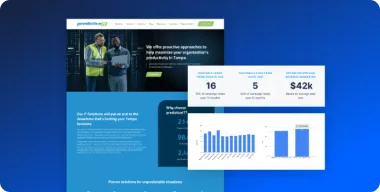Google has a long list of search algorithm updates, index changes, and refreshes. For example, the 2012 “Penguin” update added a number of “spam” metrics, including keyword stuffing, and impacted an estimated 3.1% of all English search queries. “Panda,” an even earlier update, targeted “low-quality sites” and “content farms,” and boosted the rankings of higher-quality sites. In a given year, Google can make hundreds of tweaks and updates to how their algorithm processes data and determine rankings.
Most recently, Google launched an effort to better identify content that is potentially upsetting or offensive. The goal? To prevent this content from dominating accurate and trustworthy information in the top organic search results. In other words, to stymie the proliferation of “fake news.” No matter what the update is, the takeaway is clear: Google cares about improving search results.
Why does Google care so much?
The purpose of these updates is to improve Google’s organic search engine results, because the better the results they provide, the more people use their service.
On the one hand, if a user searches for information about a particular topics, and the sites at the top of the search results lead to pages that are light on information and heavy on advertising…that’s not an enriching user experience.
On the other hand, if a top result takes users to a page that is content-rich and specific to what they searched for, Google really did them a solid. And if that site just happens to be selling something related to the content — users might just bite.
And that brings us to the subject of blogging.
The art, and science, of blogging
Blogging is an integral part of any online marketing strategy but it holds significant importance with SEO (Search Engine Optimization). At its most basic, SEO is about employing various methodologies to help a website climb higher on the search results page.
Often referred to as “organic listings,” SEO is mainly about search results based on Google’s algorithms, not on paid advertisements. The majority of searchers seldom make it beyond the first page, so hitting a top organic space is the holy grail. But how can blogging improve your ranking?
Blogging increases your organic traffic exponentially
Google’s mission is to organize the world’s information into a universally accessible and useful platform. In order to rank on its search engine, your content needs to align with that mission.
Let’s use cats, everyone’s favorite search topic, as an example. If someone searches for information about the Maine Coon breed, and you have written a blog with a veritable treasure trove of facts and data relevant to this tiger-sized cat, presented in a way that Google considers easy to absorb, your post is more likely appear higher on the results page.
Every time a user visits your blog, and reads a post beginning-to-end, you earn a little more street cred with readers — and Google. So, your authoritative blog not only helps attract users looking for specific information, it also convinces them to regularly visit your site.
Think about it this way: If one blog post gets 25 views per week, and you’re posting weekly content that remains relevant over time, that’s 25 site visits the first week, 50 the second, and by the end of the first month you have 250 site visits you didn’t have before. Continue that for six months and you’re looking at 8,775 new site visitors. You won’t even have to push what you’re selling; if only 1% of those visitors convert into customers, you’re looking at almost 90 new customers.
How can you tweak your blog posts to meet Google’s standards and avoid running afoul of one of their algorithms? Here are some tips:
- Write for your audience, not for search engines – For your content to succeed, you need to understand the problems your prospects are trying to solve. Don’t think in terms of “what will get me ranked?” Think in terms of “what is my audience searching for?” That’s how you craft thoughtful, useful content that keeps your audience returning for more.
- Don’t try to game the system – Back in the day, web developers and online marketers had a nasty habit of “keyword stuffing.” Keywords would appear in nonsensical places. Google leads the search engine industry today because of how well is handles spam like this. No matter what anyone tells you, using a keyword more often in an article does not equal higher rankings, and in extreme cases it can end up hurt your site’s performance. Two to three occurrences of relevant and natural keywords is generally enough for each page on your website.
- Socialize your blog – No matter what industry you’re in, modern SEO requires the use of social media. Not establishing a presence on Facebook, Twitter, or Instagram, puts a serious kink in your marketing reach. By utilizing as many platforms as you can, you will lead users to more than just your content, you’ll drop them at your website where they will discover a well-established blog with even more posts to share — generating more awareness, “likes,” and engagement.
- Links to your blog are priceless…usually – There was a time when the number of websites that linked to yours was all that mattered. These were known as “backlinks” and the maxim was, “…the more backlinks you have, the more popular your site will be.” Unfortunately, this led to the rise of “link farms,” or websites comprised of nothing but lists of links, which forced Google to rethink this ranking strategy.Backlinks are still important, but quality trumps quantity. If you’re getting links from a website that has little or nothing to do with your product or service, that’s a clear sign to Google that your content provides little value. If you’re naturally getting backlinks because strangers find your blogs useful, great; if not, don’t force it, but instead, invest in ways to spread the word about your great content to people who would potentially link to it.
- Goin’ Mobile – According to Pew Research, 77% of Americans own a smartphone, and 10% connect to the internet using only a smartphone. Google says more searches are conducted on mobile than on desktop, and its message is simple: Your website must be optimized for mobile devices. If you want to rank on the first page, your entire site — including your blog posts — must be easy to read on any device.
Is it all really worth it?
If you want to improve your organic rankings, engage with existing customers, and attract new ones — blogging is definitely worth the effort.
If you take nothing else away from this article, remember that blog posts need to be useful. As long as you’re helping readers solve their problems, and updating content on a regular basis, you’ll do great.
Want to learn more about tactics that can improve your site’s search performance? Check out this great article from our friends at Single Grain that cover tactics that can effectively boost your SEO in 2017.
With such an emphasis on quality content, a web marketing agency might be your best bet. At Pronto, we have a full-time team of writers who can not only provide you high-quality posts per month, but can also optimize your website to give you the best possible chance at achieving your SEO goals. Give us a call and find out what Pronto can do for you.




